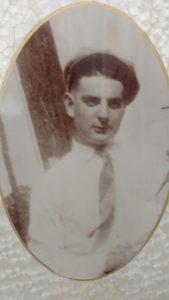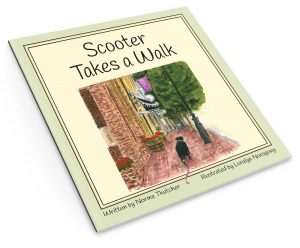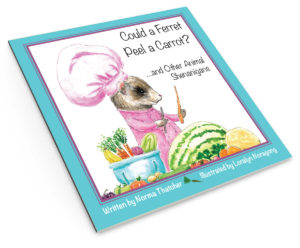
Norman W. Fox 1907 – 1931
My Aunt Winona says that my parents chose her as my baptismal sponsor and my mother let her choose my name. Lynne Elizabeth is the name she came up with, Elizabeth being my paternal grandmother’s first name.
At my baptism when the minister asked, “What name is given to this child?” my mother piped up, “Norma Lynn.” Aunt Winona, in her own words, was speechless.
I disliked my name for the first third of my life until I learned its significance.
My grandmother Elizabeth was just a young teen in the early 1900s when a male relative came and stayed with the family for a period of time. When Elizabeth’s parents were away at a funeral, the man raped Elizabeth. She told no one, likely not even understanding what had happened.
The relative had already returned to Virginia by the time the pregnancy was obvious. Her family made the best of the ordeal.
Norman W. Fox was born in 1907. His grandmother Emma raised him as her own son. This is why my father and his siblings grew up believing he was “Uncle Norman.”
The summer he was 24, Norman was dating a girl who had recently broken up with someone I’ll call Bob.
On the night of August 8, 1931, Norman had walked the girl home and was making his way back to his own house. Bob, in his car with a buddy, caught up to Norman. He beat Norman to death, and then he and the friend drove the body to a bridge. They threw him onto the railroad tracks below.
A newspaper article states, “Fox’s mangled body was found on the Pennsylvania Railroad tracks. The theory on which the officers are working is that he was murdered, with the motive not yet established, and the body put on the tracks to give the impression he had been crushed by a train.”
Grandmother Elizabeth had a nervous breakdown over Norman’s death. My grandfather had to hire a housekeeper for several years as, at the time, my grandparents had seven children between the ages of 4 and 18.
No one was ever charged with the murder. But the story does not end here.
In 1958 Elizabeth was summoned to hear a bedside confession from the woman who had run a local boarding house in the 1930s. Bob had been one of her boarders, and the night of Norman’s death, he had come home late covered in blood. He made her burn his clothes and threatened to kill her and her family if she ever told anyone about the incident. We believe he may have told her what he’d done, as she also knew the name of the buddy who had been with Bob.
After hearing the confession, my grandmother sent for my father so he could hear the story. Then they called the State Police to handle the case.
Bob was already deceased by this time, but the friend was now a model citizen. In very different times, the police left it up to my grandmother as to whether or not to press charges against the friend.
After careful consideration, my grandmother decided to let it go. No one was certain how large a part the man had played in Norman’s actual death. Certainly he was complicit to some extent. Elizabeth’s capacity for forgiveness shows the kind of woman she was.
My sisters and I aren’t sure of when our dad learned that Norman was not his uncle, but a half-brother. Norman had been dead nearly twenty years when I was born.
I like to think that naming me after Norman was my mom’s gift to her mother-in-law. Mom married into the family at the tender age of 17 and the two women didn’t always get along.
Aunt Winona says she and her sisters feared it would “kill our mother” to have a grandchild named after him. But it did not.
As one of many much-loved grandchildren, I was likely a daily reminder that life goes on, that it’s possible to reclaim a life of joy after the death of a child, and indeed, that the greatest experience in life is love.




Norma:
I was not aware of this tragedy in your family, but happy that you shared it with me and others. Family deaths are always devastating, and I have found it more difficult to deal with Tim’s death than it has been to deal with my Mother and Dad’s. Grief never leaves us but it does soften a bit with time, even though the memories continue to haunt us. I look at Tim’s picture every single day and still am somewhat in disbelief. I have taken his picture to my Support Group meeting and shared with them many times what a very special nephew Tim is.
Bill
You will always be Tim’s “Unk Bill.” I’m glad you were a joyous part of Tim’s life.
Norma Dear:
Thanks, I am weeping, even as I read your reply, and thinking about 10/6 and 10/20, and yet I forgot 9/16!!?? God’s Grace is sufficient for us all, and He holds us in His Loving Arms.
Bill
Dear Norma, Your story gave me chills. The story gives hope to all to live on and continue doing our best no matter the circumstances that come our way. Thank you for your story. Love, Ruth
Hello Ruth, I believe that providing hope to others is one of the primary responsibilities we have as God’s beloveds.
Although the makings of a suspenseful thriller…what a tender and loving reality it turned out to be!
Im so happy to have “Norma” as one of my oldest and dearest friends! Neither time nor distance has changed that!
So good to hear from you again, my dear friend! As you are aware, you are my oldest friend….in terms of you are the first friend I can recall having. So glad you are still in my life.
This had me in tears! What an amazing way to explain that there is tremendous power in letting go, and that the lesson keeps going down generation after generation. Wonderful piece as always!
Thank you, my beautiful friend.